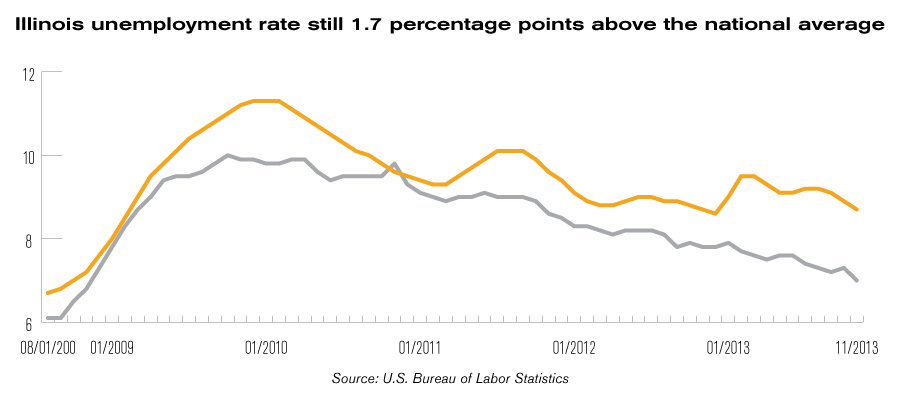Illinois unemployment rate falls to 8.7%, continues to lag behind national average
Illinois’ unemployment rate fell to 8.7 percent in November from 8.9 percent a month prior, according to the U.S. Bureau of Labor Statistics. Illinois still has the fourth-highest unemployment rate in the nation, behind only Nevada, Rhode Island and Michigan. The state gained 9,400 payroll jobs over the month, while the number of unemployed Illinoisans...
Illinois’ unemployment rate fell to 8.7 percent in November from 8.9 percent a month prior, according to the U.S. Bureau of Labor Statistics. Illinois still has the fourth-highest unemployment rate in the nation, behind only Nevada, Rhode Island and Michigan. The state gained 9,400 payroll jobs over the month, while the number of unemployed Illinoisans fell by nearly 12,000.
November’s job numbers are nothing to get excited about.
Illinois is barely riding the coattails of a national drop in unemployment; almost every state has improved its job numbers. Illinois’ neighbors all have lower unemployment rates: Iowa (4.4 percent), Missouri (6.1), Wisconsin (6.3), Indiana (7.3) and Kentucky (8.3).
Illinois’ unemployment rate is still 1.7 percentage points higher than the national average, and there are still nearly 570,000 struggling Illinoisans who are unemployed.
It’s been four years since the end of the Great Recession and the state still has 160,000 fewer jobs now than it did in 2007.
Illinois can improve on its rate of job creation, but inadequate pension reforms, pay-to-play corporate welfare and the calls for even higher taxes are holding the state back.
To restore real job growth and true prosperity, Illinois politicians and their failed policies need to be swept aside so investors can regain confidence and begin building plants and factories in Illinois again.
The state can continue to encourage job creation by lowering its corporate income tax rate to encourage business investment, reducing onerous and costly regulations that stifle entrepreneurship and passing labor reforms to make Illinois a more attractive businesses destination.
Enacting such pro-growth and pro-business reforms will bring back employment opportunities that Illinoisans need.

